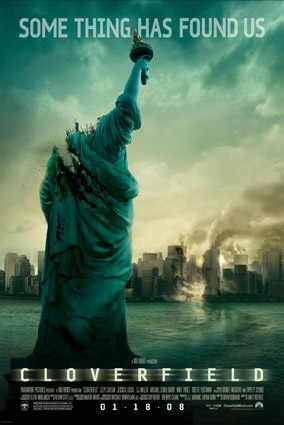
Cloverfield

Cloverfield is a big-budget end of the world tale disguised as an independent film. Rather than being just another monster/disaster movie, the creators of Cloverfield have taken a unique approach, choosing to dramatize their story through the eyes of, or more specifically, the video lens of the affected characters -- this helps the audience to identify with the protagonists’ confusion and fear of the unknown. This method was used to great effect in 1999’s The Blair Witch Project, but Cloverfield ups the ante by throwing in spectacular visual effects.
As a group of twentysomethings throw a going-away party for one of their own, their comments are recorded on a hand-held video camera with its inherent breaks in action. Soon, distant explosions are followed by vague and speculative news reports about dramatic events unfolding elsewhere in (the perpetually beleaguered) New York. The revelers flee to the streets in a desperate fight for survival, as the Statue of Liberty’s head lands nearby in one of the film’s most striking moments (inspired by the poster for, but not actually occurring in, 1981’s Escape from New York). They soon realize an enormous insect-like monster is destroying the city, aided by its smaller offspring.
As the film begins, a caption supposedly by the U.S. Department of Defense identifies the classified video as having been retrieved at the area “formerly known as Central Park”, an obvious warning not to expect a happy ending. And it seems to be the only surviving record of this shocking event, like Abraham Zapruder’s infamous 1963 footage of Kennedy’s assassination. Thus, the dynamic use of a single camcorder to depict the dizzying goings-on gives the film a sense of immediacy and a voyeuristic feel, as if the audience is seeing something it shouldn’t.
Cloverfield is a brilliant analogy of contemporary life, when anyone can post gritty-looking video on YouTube and accidents are replayed incessantly on Spike TV. It also plays to our anxieties over government secrecy and conspiracy theories, with many questions left unanswered.
This is no surprise, since director Matt Reeves, producer J. J. Abrams, and writer Drew Goddard have collectively written, produced and directed television’s Lost. Reeves has paced his film like an amusement park thrill ride, and subsequent viewings will undoubtedly reveal new images. To ensure a PG-rating, Abrams keeps the gore to a minimum, and wisely keeps the film’s running time to a mere 84 minutes, which leaves you wanting more. Goddard’s introductory social banter and small talk make the horrors to come all the more unexpected, and his unpredictable screenplay appears totally unscripted.
Thus, the cast members deliver their lines with believable spontaneity, as they each react to the chaos with varying levels of hysteria. Separated during the mass evacuation, much of the film follows a quartet of refugees: leader Rob (Michael Stahl-David), who is desperate to rescue his lost love Beth (Odette Yustman); tough and sarcastic Marlena (Lizzy Caplan); elegant and sensible Lily (Jessica Lucas); and dimwitted cameraman Hud (T.J. Miller), who is mostly heard and rarely seen.
As in Jaws, the tension and power of the film build because the monster itself is never clearly shown until the end…though some may find its similarity to those in Starship Troopers a turnoff.
Nevertheless, Cloverfield is an assault on the senses from start to finish, with only a touching scene in a deserted underground subway station giving the audience a chance to breathe. But pacemaker wearers beware – the frequent rumblings are of a decibel you can feel in your heart. And shots of collapsing buildings and subsequent dust clouds are eerily reminiscent of 9/11.
Though January has traditionally been a dumping ground for films the studious have little faith in, Cloverfield blasts this practise apart. Paying homage to some of cinema’s best disaster epics, it is a refreshing, chilling and thoroughly entertaining film. Cloverfield will grab you in its teeth, shake you around, and spit you out. Rating: 8 out of 10.